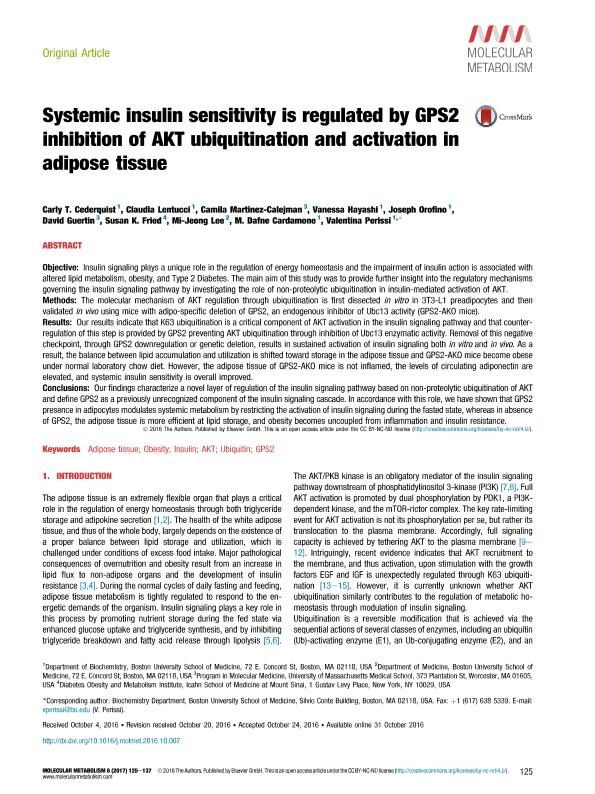Artículo
Systemic insulin sensitivity is regulated by GPS2 inhibition of AKT ubiquitination and activation in adipose tissue
Cederquist, Carly T.; Lentucci, Claudia; Martinez Calejman, Camila ; Hayashi, Vanessa; Orofino, Joseph; Guertin, David; Fried, Susan K.; Jeong Lee, Mi; Cardamone, M. Dafne; Perissi, Valentina
; Hayashi, Vanessa; Orofino, Joseph; Guertin, David; Fried, Susan K.; Jeong Lee, Mi; Cardamone, M. Dafne; Perissi, Valentina
 ; Hayashi, Vanessa; Orofino, Joseph; Guertin, David; Fried, Susan K.; Jeong Lee, Mi; Cardamone, M. Dafne; Perissi, Valentina
; Hayashi, Vanessa; Orofino, Joseph; Guertin, David; Fried, Susan K.; Jeong Lee, Mi; Cardamone, M. Dafne; Perissi, Valentina
Fecha de publicación:
01/2017
Editorial:
Elsevier
Revista:
Molecular Metabolism
ISSN:
2212-8778
Idioma:
Inglés
Tipo de recurso:
Artículo publicado
Clasificación temática:
Resumen
Objective Insulin signaling plays a unique role in the regulation of energy homeostasis and the impairment of insulin action is associated with altered lipid metabolism, obesity, and Type 2 Diabetes. The main aim of this study was to provide further insight into the regulatory mechanisms governing the insulin signaling pathway by investigating the role of non-proteolytic ubiquitination in insulin-mediated activation of AKT. Methods The molecular mechanism of AKT regulation through ubiquitination is first dissected in vitro in 3T3-L1 preadipocytes and then validated in vivo using mice with adipo-specific deletion of GPS2, an endogenous inhibitor of Ubc13 activity (GPS2-AKO mice). Results Our results indicate that K63 ubiquitination is a critical component of AKT activation in the insulin signaling pathway and that counter-regulation of this step is provided by GPS2 preventing AKT ubiquitination through inhibition of Ubc13 enzymatic activity. Removal of this negative checkpoint, through GPS2 downregulation or genetic deletion, results in sustained activation of insulin signaling both in vitro and in vivo. As a result, the balance between lipid accumulation and utilization is shifted toward storage in the adipose tissue and GPS2-AKO mice become obese under normal laboratory chow diet. However, the adipose tissue of GPS2-AKO mice is not inflamed, the levels of circulating adiponectin are elevated, and systemic insulin sensitivity is overall improved. Conclusions Our findings characterize a novel layer of regulation of the insulin signaling pathway based on non-proteolytic ubiquitination of AKT and define GPS2 as a previously unrecognized component of the insulin signaling cascade. In accordance with this role, we have shown that GPS2 presence in adipocytes modulates systemic metabolism by restricting the activation of insulin signaling during the fasted state, whereas in absence of GPS2, the adipose tissue is more efficient at lipid storage, and obesity becomes uncoupled from inflammation and insulin resistance.
Archivos asociados
Licencia
Identificadores
Colecciones
Articulos(CEFYBO)
Articulos de CENTRO DE ESTUDIOS FARMACOLOGICOS Y BOTANICOS
Articulos de CENTRO DE ESTUDIOS FARMACOLOGICOS Y BOTANICOS
Citación
Cederquist, Carly T.; Lentucci, Claudia; Martinez Calejman, Camila; Hayashi, Vanessa; Orofino, Joseph; et al.; Systemic insulin sensitivity is regulated by GPS2 inhibition of AKT ubiquitination and activation in adipose tissue; Elsevier; Molecular Metabolism; 6; 1; 1-2017; 125-137
Compartir
Altmétricas



